Choosing the Best Type of Internet for your Business

Fast, reliable internet has become one of the core essentials for modern businesses. Your team depends on it for everything—cloud storage, customer communication, video conferencing, online transactions, and the daily workflow that keeps operations moving. Choosing the best internet for your business means understanding how your workplace uses bandwidth and which connection can handle both current and future activity.
Before comparing plans, it helps to look closely at your actual usage. A small team that mainly handles email or light browsing might manage on basic broadband, while companies relying heavily on collaboration tools, VoIP systems, file sharing, or remote work will need something far more powerful. Even for smaller operations, business-grade internet is worth considering since it typically provides more reliable uptime and dedicated support.
Many businesses begin their search by checking available options through our trusted list of internet providers, where you can instantly see which services are available in your area.
Main Types of Business Internet Connections
Every type of connection offers different benefits, and the right choice depends largely on your location, speed requirements, and how your business operates.
Cable Internet
Cable internet remains one of the most widely used options for small and mid-sized businesses thanks to its strong performance and widespread availability.
Pros
- Download speeds typically between 50 Mbps and 500 Mbps
- Supports multiple devices and users at the same time
- Availability in most commercial areas
Cons
- Shared bandwidth may slow down during peak periods
- Upload speeds are much lower than downloads, which can affect file-heavy workflows
DSL (Digital Subscriber Line)
DSL uses existing telephone lines and provides a stable, budget-friendly connection for businesses with light to moderate usage.
Pros
- Cost-effective
- Reliable for email, browsing, and simple cloud tools
Cons
- Speeds top out around 15 Mbps download
- Performance declines with distance from the provider’s central office
Fiber-Optic Internet
Fiber is considered the top-performing connection for businesses needing high speed and dependable stability. It uses light transmitted through thin fibers to deliver consistently fast internet.
Pros
- Download speeds reaching up to 1 Gbps
- Extremely fast uploads (ideal for cloud storage, backups, and large file transfer)
- Less vulnerable to weather, distance, or interference
- Naturally secure infrastructure
Cons
- Higher cost than cable or DSL
- Limited availability in some areas
- Requires professional installation
For companies working with large data files or running cloud-heavy operations, fiber provides a long-term advantage.
Fixed Wireless Internet
Fixed wireless delivers internet via radio signals from a nearby tower to a mounted antenna. It’s especially useful in areas where wired infrastructure is limited.
Pros
- Strong performance where cable and fiber are unavailable
- Quick installation with no need for trenching or cable work
Cons
- Physical obstructions like tall buildings or dense trees can affect the signal
- Coverage depends on distance to the provider’s towers
Satellite Internet
Satellite internet connects through a dish that communicates with orbiting satellites. It works in locations where other internet types simply don’t reach, though it does come with certain limitations.
Pros
- Available in very remote or rural areas
- Easy to install
Cons
- High latency affects real-time communication
- Slow speeds (around 3–15 Mbps)
- Weather conditions may interrupt service
Dial-Up Internet
Dial-up internet is now outdated and doesn’t meet the demands of modern business tools. Unless it is the absolute last resort, it should be avoided.
Factors to Consider When Choosing Business Internet
Speed Requirements
Evaluate how much bandwidth your team needs. Daily video conferences, cloud storage, and large file uploads all require faster speeds to operate smoothly.
Reliability
Strong uptime and dependable service matter for any customer-facing or time-sensitive work. Business connections usually offer better reliability guarantees.
Scalability
Your internet should be able to grow with your business. Flexible upgrade options help avoid unnecessary bottlenecks as your operation expands.
Security
Business-level internet typically includes enhanced security measures such as firewalls, encrypted data, and DDoS protection to keep your systems safe.
Cost and Value
Price is important, but overall performance and reliability should carry more weight. Paying slightly more for quality can save time and prevent workflow interruptions.
Service Level Agreement (SLA)
An SLA outlines uptime guarantees, response times, and compensation for outages. This is a key difference between residential and business internet plans.
Optimizing Your Business Internet
Use Wired Connections for Priority Workstations
Ethernet cables deliver stable, low-latency connectivity, making them ideal for devices that require consistent performance.
Upgrade Routers and Access Points
Business-grade equipment improves coverage, handles more devices, and provides stronger overall security.
Monitor Network Traffic
Tracking usage helps you understand when bandwidth spikes happen and whether your operations are pushing current limits.
Add a Backup Connection
A secondary line keeps your team online during outages and protects against lost productivity.
Strengthen Network Security
Implement VPNs, strong passwords, and firewalls to safeguard sensitive data and prevent unauthorized access.
Finding the Best Fit for Your Business
Your ideal internet connection depends on balancing speed, reliability, and future growth. Cable and DSL may be enough for light usage, while teams dependent on cloud collaboration, large data files, or real-time communication benefit greatly from fiber or fixed wireless.
A strong, secure connection isn’t just a utility—it’s an investment in productivity, customer experience, and long-term scalability. Understanding your needs and comparing providers helps ensure your business stays connected and competitive.
Related Posts
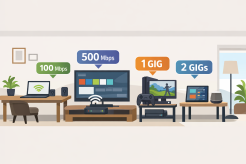
Wed, Feb 4, 2026 3:32 AM
Internet Bundles cheap internet deals cheap internet offersWindstream Internet Plans & Deals in 2026
What makes Windstream great is, internet service has no data cap, reliable internet, and there is always a real person to call when you needed help. Here, we are going to discuss what are the best Windstream deals, and details.
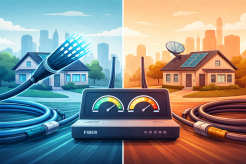
Tue, Feb 3, 2026 2:11 AM
Internet BundlesFiber Internet vs. Cable Internet: Which One Fits Your Home?
Compare fiber internet vs cable internet for speed, reliability, cost, and availability to find the best home internet option for your needs.
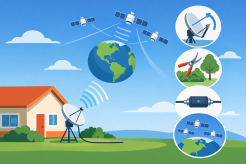
Tue, Feb 3, 2026 1:59 AM
Technology Broadband InstallationHow to Boost Satellite Internet Signal Fast and Easily
Satellite internet can be a good option for rural areas. But if you are having a slow internet connection, you can try this solution to boost satellite internet.
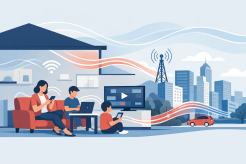
Fri, Jan 30, 2026 2:53 AM
Internet Bundles cheap internet offers cheap internet plansWhat’s New With Verizon: Plans, Speeds, and Network Updates
Explore the latest Verizon plans, pricing, and network updates, including wireless Unlimited plans, Fios fiber internet, and 5G home options.
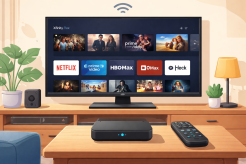
Thu, Jan 29, 2026 5:53 AM
Internet BundlesXfinity Flex 4K Streaming Box: What You Get and Why It’s Worth It
Discover what Xfinity Flex offers, including free movies, 4K streaming, supported apps, pricing, and whether it’s worth it for Xfinity Internet users.